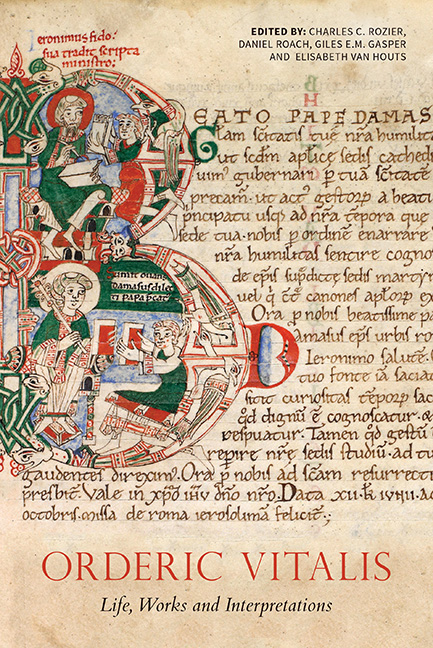Book contents
- Frontmatter
- Dedication
- Contents
- List of Illustrations
- Acknowledgements
- List of Abbreviations
- Chronology of the Lives of Odelerius and his Son Orderic Vitalis
- Composition of the Historia ecclesiastica
- Introduction: Interpreting Orderic Vitalis
- Orderic and his Father, Odelerius
- Following the Master's Lead: The Script of Orderic Vitalis and the Discovery of a New Manuscript (Rouen, BM, 540)
- Orderic Vitalis as Librarian and Cantor of Saint-Évroul
- Saint-Évroul and Southern Italy in Orderic's Historia ecclesiastica
- Orderic and English
- Inscriptions in Orderic's Historia ecclesiastica: A Writing Technique between History and Poetry
- Reading Orderic with Charters in Mind
- Orderic Vitalis and the Cult of Saints
- Orderic's Secular Rulers and Representations of Personality and Power in the Historia ecclesiastica
- Worldly Woe and Heavenly Joy: The Tone of the Historia ecclesiastica
- Orderic Vitalis, Historical Writing and a Theology of Reckoning
- Jesus Christ, a Protagonist of Anglo-Norman History? History and Theology in Orderic Vitalis's Historia ecclesiastica
- ‘Studiosi abdita investigant’: Orderic Vitalis and the Mystical Morals of History
- Meanders, Loops, and Dead Ends: Literary Form and the Common Life in Orderic's Historia ecclesiastica
- Orderic and the Tironensians
- ‘One single letter remained in excess of all his sins …’: Orderic Vitalis and Cultural Memory
- The Reception of Orderic Vitalis in the Later Middle Ages
- Appendix 1 Archaeological Investigations at the Abbey of Saint-Évroult-Notre-Dame-des-Bois
- Appendix 2 Descriptive Catalogue of Manuscripts Featuring the Hand of Orderic Vitalis
- Select Bibliography
- List of Manuscripts Cited
- General Index
Orderic Vitalis and the Cult of Saints
Published online by Cambridge University Press: 25 October 2017
- Frontmatter
- Dedication
- Contents
- List of Illustrations
- Acknowledgements
- List of Abbreviations
- Chronology of the Lives of Odelerius and his Son Orderic Vitalis
- Composition of the Historia ecclesiastica
- Introduction: Interpreting Orderic Vitalis
- Orderic and his Father, Odelerius
- Following the Master's Lead: The Script of Orderic Vitalis and the Discovery of a New Manuscript (Rouen, BM, 540)
- Orderic Vitalis as Librarian and Cantor of Saint-Évroul
- Saint-Évroul and Southern Italy in Orderic's Historia ecclesiastica
- Orderic and English
- Inscriptions in Orderic's Historia ecclesiastica: A Writing Technique between History and Poetry
- Reading Orderic with Charters in Mind
- Orderic Vitalis and the Cult of Saints
- Orderic's Secular Rulers and Representations of Personality and Power in the Historia ecclesiastica
- Worldly Woe and Heavenly Joy: The Tone of the Historia ecclesiastica
- Orderic Vitalis, Historical Writing and a Theology of Reckoning
- Jesus Christ, a Protagonist of Anglo-Norman History? History and Theology in Orderic Vitalis's Historia ecclesiastica
- ‘Studiosi abdita investigant’: Orderic Vitalis and the Mystical Morals of History
- Meanders, Loops, and Dead Ends: Literary Form and the Common Life in Orderic's Historia ecclesiastica
- Orderic and the Tironensians
- ‘One single letter remained in excess of all his sins …’: Orderic Vitalis and Cultural Memory
- The Reception of Orderic Vitalis in the Later Middle Ages
- Appendix 1 Archaeological Investigations at the Abbey of Saint-Évroult-Notre-Dame-des-Bois
- Appendix 2 Descriptive Catalogue of Manuscripts Featuring the Hand of Orderic Vitalis
- Select Bibliography
- List of Manuscripts Cited
- General Index
Summary
Over the past few years, various historians have focused on the Historia ecclesiastica of Orderic Vitalis, of which Chibnall produced such a wonderful edition over thirty years ago. They have discussed in particular the work's intended audience and the author's methods, but none of their studies discuss to any great degree the treatment of the cult of saints by the historian of Saint-Évroul. Thus, the article Mégier published in 2000 (offering an explanation for the work's limited audience) refers to the work's historical content, but does not explicitly mention the cult of saints. Other historians have focused their attention on the historian angligena of the pays d'Ouche, most notably Albu and Hingst, and Bickford-Smith has acknowledged the theological and biblical aspects of the Historia ecclesiastica, but none of these studies pays any particular attention to the way in which Orderic deals with the cult of saints. In fact, the only person who may have shown an interest in the question of the cult of saints is Ray. His thesis, defended in the late 1960s, remains unpublished, but from it came an article that attempts to demonstrate that Orderic's work, conceived in a monastic context, was destined to be used liturgically by the monks of the abbey.
In The World of Orderic Vitalis, Chibnall offers a brief survey of some of the saints mentioned in the Historia ecclesiastica, focusing in particular on saints Évroul, Nicholas, Judoc, Guthlac and Waltheof.4 For each of these individuals, Chibnall cites hagiographical texts as well as the miracles and relics mentioned in Orderic's work. There are, however, more than 100 saints mentioned at least once in the Historia ecclesiastica. Simply to compile list of these saints would not reveal Orderic's criteria for choosing to mention them, whereas asking about the extent of his knowledge for each one, and what he records about them, would provide enough material to fill a thesis. This discussion, therefore, will examine a number of case studies that seem to characterise Orderic's methods and interests. The first section concerns those saints honoured in the time of the Franks (that is to say, before the accession of the Normans in the duchy) and the Anglo- Saxons, the second will deal with the warrior saints, and the final section will reconsider the case of St Nicholas.
- Type
- Chapter
- Information
- Orderic Vitalis: Life, Works and Interpretations , pp. 172 - 188Publisher: Boydell & BrewerPrint publication year: 2016



